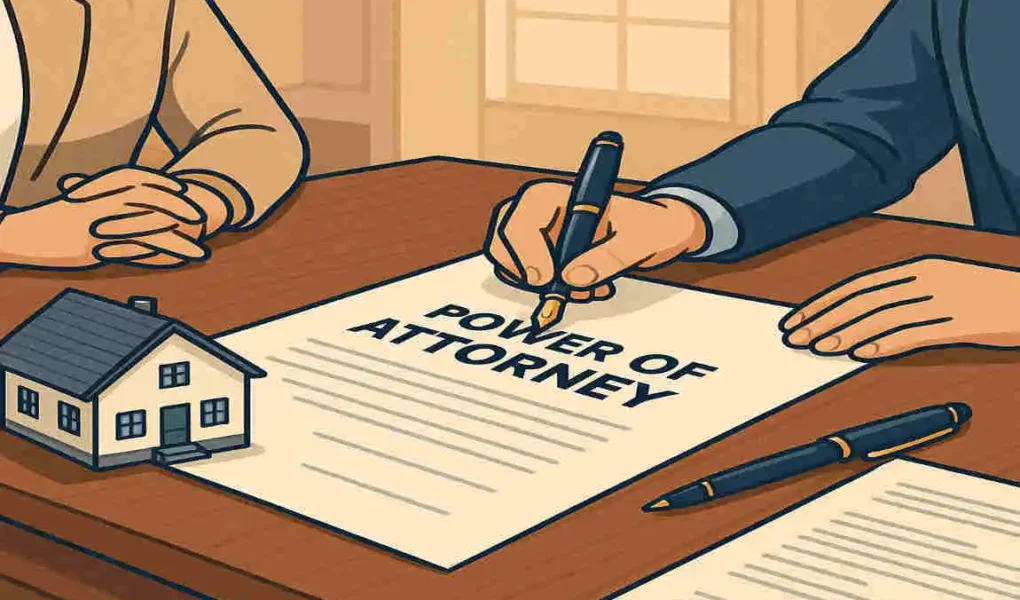In the world of real estate, legal documents play a crucial role in ensuring smooth and secure transactions. One such document that often comes into play is the Power of Attorney (POA). If you’ve ever wondered, “What is a poa in real estate?” you’re not alone.
What Is a POA in Real Estate? – Basic Definition

A Power of Attorney in real estate is a legal document that grants someone else the authority to act on your behalf in property-related matters. This person, known as the agent or attorney-in-fact, can make decisions, sign documents, and perform various tasks related to your real estate transactions. There are two main types of POA:
- General POA: This type gives broad powers to the agent to handle multiple real estate transactions and decisions.
- Specific POA: This type is limited to a single property or transaction, with clearly defined powers and responsibilities.
POA is crucial in real estate because it allows you to have someone you trust handle your property matters when you’re unable to do so yourself. Some real-life scenarios where a POA comes in handy include:
- Buying or selling a property while you’re out of the country
- Managing rental properties when you live far away
- Handling real estate transactions when you’re ill or incapacitated
How Does a Real Estate POA Work?
To grant a POA in real estate, you (the principal) must choose someone you trust to be your agent. This can be a family member, friend, or a professional, such as a real estate attorney. The legal requirements for creating a valid POA vary by state, but generally, the document must be in writing, signed by you, and notarized.
Once the POA is in place, your agent has the authority to perform the specified real estate tasks on your behalf. This may include:
- Negotiating and signing purchase or sale agreements
- Applying for mortgages and signing loan documents
- Managing rental properties and signing leases
- Attending closings and signing transfer documents
It’s important to note that the agent’s power is not unlimited. The POA document should clearly specify the scope of authority, and the agent must act in your best interests and follow your instructions at all times.
Common Uses of a Real Estate POA
A POA in real estate can be used for various purposes, depending on your needs and circumstances. Some common uses include:
- Buying or selling property: If you’re unable to attend the closing or sign the necessary documents, your agent can do so on your behalf.
- Managing rental properties: Your agent can handle tasks such as finding tenants, signing leases, and collecting rent on your behalf.
- Handling mortgage documents: If you’re securing financing for a property, your agent can sign the loan agreements and related paperwork.
- Closing real estate deals remotely: If you live far from the property or can’t be present for the closing, your agent can represent you and complete the transaction.
Types of Real Estate POA Documents

There are several types of POA documents used in real estate, each with its own specific purpose and duration. The most common types are:
- Durable POA: This type remains in effect even if you become incapacitated, allowing your agent to continue managing your real estate affairs.
- Springing POA: This type only takes effect upon a specific event, such as your incapacitation, and is helpful for emergency situations.
- Specific POA: As mentioned earlier, this type is limited to a single property transaction and expires once the task is completed.
When choosing the type of POA, consider your specific needs, the duration of the authority, and the level of control you want to maintain over your real estate matters.
Benefits of Using a POA in Real Estate
Using a POA in real estate offers several key benefits:
- Convenience: A POA allows you to handle property matters without being physically present, saving you time and effort.
- Avoiding delays: By having an agent who can act on your behalf, you can prevent delays in transactions that result from your unavailability.
- Flexibility: A POA gives you the flexibility to manage your real estate affairs even when you’re traveling, ill, or otherwise incapacitated.
- Legal protection: A well-drafted POA can help protect your interests and prevent legal disputes related to your property transactions.
Risks and Precautions When Using a Real Estate POA
While a POA can be a valuable tool, it’s essential to be aware of the potential risks and take appropriate precautions:
- Misuse or fraud: There’s a risk that your agent may misuse their authority or engage in fraudulent activities. To mitigate this, choose someone you trust implicitly and consider setting limits on their power.
- Selecting a trustworthy agent: Take the time to carefully consider who you appoint as your agent. They should be responsible, reliable, and have your best interests at heart.
- Legal safeguards: Make sure your POA document includes provisions for revoking or modifying the authority if needed. Regularly review and update the document to ensure it reflects your current wishes.
- Monitoring: Stay informed about the actions your agent takes on your behalf and ask for regular updates to ensure they’re acting appropriately.
How to Create a Real Estate Power of Attorney
Creating a valid and enforceable POA for real estate house involves several key steps:
- Drafting: Collaborate with a legal professional to create a POA document that incorporates the necessary language, clauses, and state-specific requirements.
- Notarization: Most states require POA documents to be notarized, which means signing the document in the presence of a notary public.
- Witnessing: Some states also require the POA to be seen by one or more disinterested parties.
- Filing: In some cases, you may need to file the POA with the local land records office or provide copies to relevant parties, such as banks or title companies.
Be sure to follow your state’s specific requirements for creating a valid POA to ensure its legal enforceability.
Legal Validity and Enforcement of a Real Estate POA
In most cases, a properly executed POA is legally valid and enforceable. However, there are situations where a POA may be challenged or deemed invalid, such as:
- The principal was not of sound mind when granting the POA
- The POA was obtained through fraud, duress, or undue influence
- The agent acted outside the scope of their authority
- The POA was not properly executed according to state law
If a POA is revoked or expires, the agent’s authority ends immediately. It’s crucial to keep track of the POA’s duration and make necessary updates or revocations promptly.




